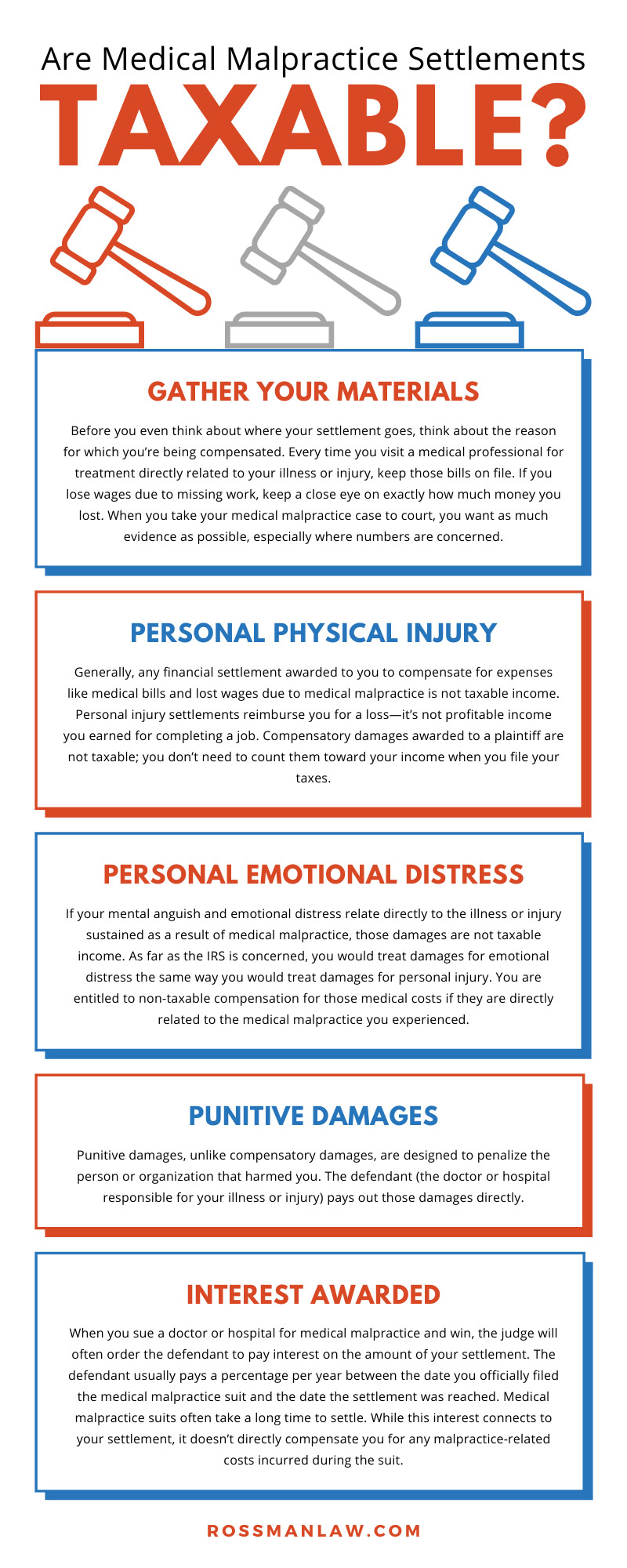
What Is Your Next Step After an SSDI Denial of Benefits?
August 11, 2021
Are Wrongful Death Lawsuit Settlements Taxable?
August 17, 2021If you believe you’re a victim of medical malpractice, you may be entitled to financial restitution for your unfortunate ordeal. But what do you do with that money once you receive it? Does the IRS need to know about it when tax season comes along? As you pore through your paperwork, pay close attention to detail and consult your attorney for guidance. Depending on the type of damages awarded and the reasons for them, the money you receive may or may not count toward taxable income. If you’ve enlisted the services of a catastrophic injury lawyer in Idaho like those at Rossman Law Group, they can guide you through the process, including the financial aspects. Let’s look at what all those words mean and answer the question thoroughly: are medical malpractice settlements taxable?
Gather Your Materials
Before you even think about where your settlement goes, think about the reason for which you’re being compensated. Every time you visit a medical professional for treatment directly related to your illness or injury, keep those bills on file. If you lose wages due to missing work, keep a close eye on exactly how much money you lost. When you take your medical malpractice case to court, you want as much evidence as possible, especially where numbers are concerned. These costs can originate from many sources. A physical therapist who works with you to regain mobility lost due to injury will cost you money. A mental health professional who helps you deal with post-traumatic stress from your ordeal will charge per session. Every time you receive a bill for treatment directly related to your illness or injury, keep it in a special file. Make copies for your attorney, too.
Personal Physical Injury
Generally, any financial settlement awarded to you to compensate for expenses like medical bills and lost wages due to medical malpractice is not taxable income. Personal injury settlements reimburse you for a loss—it’s not profitable income you earned for completing a job. Compensatory damages awarded to a plaintiff are not taxable; you don’t need to count them toward your income when you file your taxes.
There is an exception, however. As you pay the medical expenses related to your illness or injury caused by malpractice, ensure you deduct those costs from your taxes. If you have claimed these medical expenses as deductions on past tax forms, a portion of your settlement may be taxable.
Personal Emotional Distress
If your mental anguish and emotional distress relate directly to the illness or injury sustained as a result of medical malpractice, those damages are not taxable income. As far as the IRS is concerned, you would treat damages for emotional distress the same way you would treat damages for personal injury. You are entitled to non-taxable compensation for those medical costs if they are directly related to the medical malpractice you experienced. As we discussed above, if you seek psychiatric help for post-traumatic stress directly related to your illness or injury, save those bills. You deserve compensation for those extra costs.
On the other hand, if your emotional distress is not directly caused by the physical illness or injury in question, any compensation you receive for it will be taxable. If you incur extra medical costs or lose wages due to mental anguish unrelated to the original illness or injury, you must declare that part of your settlement on your taxes. For example, if the ongoing stress of the legal process causes you to seek therapy or psychiatric help, any compensation you receive for it will be taxable.
Punitive Damages
Punitive damages, unlike compensatory damages, are designed to penalize the person or organization that harmed you. The defendant (the doctor or hospital responsible for your illness or injury) pays out those damages directly.
This payment is intended to punish the person or organization that wronged you and deter them from doing it again. This part of your settlement doesn’t directly compensate you for any losses or extra costs you incurred. This means punitive damages are taxable income and you must declare them as such. In movies and TV shows, these damages often get lumped under the “pain and suffering” label. But since they don’t directly compensate you for costs associated with that pain and suffering, they do count as taxable income. Sit down with your catastrophic injury lawyer and go through your settlement line by line. Make sure you know the difference between punitive damages and direct compensation for costs related to emotional distress. This information will be crucial when tax season comes around.
Interest Awarded
When you sue a doctor or hospital for medical malpractice and win, the judge will often order the defendant to pay interest on the amount of your settlement. The defendant usually pays a percentage per year between the date you officially filed the medical malpractice suit and the date the settlement was reached. Medical malpractice suits often take a long time to settle. While this interest connects to your settlement, it doesn’t directly compensate you for any malpractice-related costs incurred during the suit. Therefore, any interest you collect on your settlement counts as income and you must report it as such on your taxes. Once you receive your settlement, go through the paperwork with your attorney and make sure you know how much of it is taxable.
Medical malpractice is a painful ordeal to undergo, and the ensuing legal process can be confusing. Luckily, you don’t have to do it alone. Rossman Law Group is here to take the confusion out of reaching a settlement. If you believe you have been the victim of medical malpractice, contact us to explore your options. We will remain by your side from the moment you consider filing a suit to the time you spend poring over your settlement. Don’t be afraid to ask questions, and keep a record of all compensation you receive. Whether or not medical malpractice settlements are taxable is a loaded question, but one that we’re ready to unload and unpack for you.






